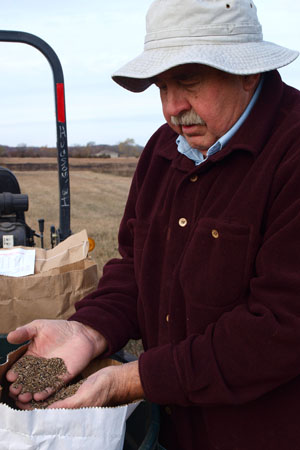Henry Panowitsch
Prairie advocate, philosopher, and enthusiast
A prairie advocate, a prairie philosopher, a prairie enthusiast describe Henry Panowitsch who came over from Germany as a young man to stay with relatives on a farm near Nicollet. Henry’s interest in the outdoors started at a young age after spending time with a Forester in the woods of his native country and living on an American farm. This led him to purchase forty-five acres of land where he tenderly improves and protects both woodland and prairie ecosystems.
“Over the past nine years I have improved my 25 acres of woodlands by thinning and planting trees along with introducing a variety of woodland plants,” exclaims Henry Panowitsch. He has also planted and maintained 15 acres of native prairie with help of his mentor, Randy Schindle, a MN DNR Forester and Prairie expert. Two years ago Henry teamed up with Randy and Scott Seigfreid to found the Many Rivers Chapter of the Prairie Enthusiasts. Today this chapter boosts over 60 members striving to locate and restore original prairie remnants as its main mission.
Henry spent his career working in public schools of the Twin Cities as a special education coordinator, school psychologist and high school teacher. In addition to a Bachelor of Science degree in Education from the Minnesota State University, Mankato, Panowitsch has a Masters of Liberal Arts in Western Traditions from Valparaiso University of Indiana and a PHD in School Psychology from the University of Minnesota. Retirement has given him the time to become both a Master Gardener and a Minnesota Naturalist. Currently, Henry serves on the Prairie Enthusiasts’ National Board representing the Many Rivers Chapter.
“I am fortunate enough to have the Maple River run through a part of my prairie farm and woodlands. Even in the few years I have owned this property I have seen firsthand the great fluctuation in water flow, as well as observing in disbelief the amount of damage to the riverbanks. At the same time, I am touched by the diversity of life that still exists in the river and how many competent and caring people are working to stabilize and heal the river again. I talk to anyone who will listen to educate them how important it is for all of us to take care of the river because it the most visible reflection of how effectively we deal with our environment. It has become obvious to me that healing the river is everyone’s responsibility. Healthy woodlands and prairie environments are the gentle hands that facilitate this.”



